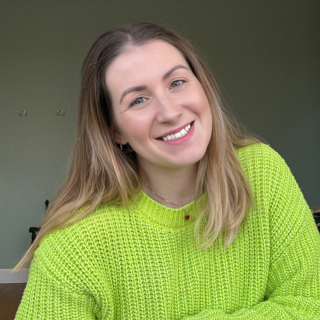
Heidi McCallion
Registered Member M¬йґє‘≠іі
Contact information
Therapist - Birmingham
Features
- Concessionary rates
Availability
Update: Currently accepting new clients.
My approach is all about therapy options, not barriers:
Come weekly, fortnightly, come once as a 'one off', come online or in person - whatever suits you!
About me and my therapy practice
Hi, IвАЩm Heidi
I help people who feel stuck, in their own inner messiness, to gently untangle it, find clarity, and embrace their whole self.
Unfiltered, real, and wonderfully human.
I am based in south Birmingham in person and online.
I highly recommend visiting my website for a better sense of who I am and the work I offer: theattunedroom.co.uk
Let me guess, youвАЩve spent ages on вАШfind a therapistвАЩ pages, scrolling and hoping something just feels right.
I get it, IвАЩve been there too, so I'm glad you have landed here.
IвАЩm a qualified and registered psychotherapist with 10 yearsвАЩ experience within the NHS, education settings, the private sector, family centres and therapeutic communities. IвАЩve supported adults, parents, teens, and little ones through all sorts of challenges and life stages.
If something here resonates, IвАЩd love to chat - just drop me a message and we can take it from there.
Practice description
Therapy matters, but itвАЩs not everything.
One session is only about 0.6% of your week. The real work happens in the other 99.4%, as you start to weave what we explore together into your everyday life.
Still, that 0.6% matters deeply to me.
ItвАЩs a privilege to be trusted with your story, and I hold that space with care and respect. My approach is integrative, where we untangle the tough stuff, together.
My practice is tailored to 3 distinctive groups of people:
1. Adults
2. Students in higher education
3. Children & adolescents (aged 5 - 17)
What is therapy like with Heidi at The Attuned Room:
рЯНѓ A melting pot of therapeutic approaches to see what fits you
рЯ§Э Relationship-centred
рЯО® Creative + flexible
рЯМЕ Trauma informed
вП≥ Explores how past experiences may have shaped your life today, and how to make changes to break patterns of thinking, feeling & doing ... if you wish to
рЯМИ LGBTQIA+ inclusive & affirming
Some of the areas I work closely with:
рЯС• Those navigating relationship challenges or breakdowns
рЯМњ Those feeling stuck, unsure, or struggling with self-worth
рЯФ• High-achievers feeling the strain
рЯ§Н Those processing trauma or difficult past experiences
How I support students:
рЯІ≠ A therapist who 'gets' the uni experience
рЯ™і A calm space away from campus and home pressures
рЯТЈ Student-friendly sensitivity
My work with children & adolescents is:
рЯІЄ (Ages 5 - 12) Therapy that meets them in their world
рЯОІ (Aged 13 - 16) Space to talk, think, and feel seen
рЯЫ°пЄП Parent/carer involvement in safety planning
My first session
I know that starting therapy can feel daunting, so I like to keep the first steps simple and low-pressure.
When you get in touch, IвАЩll offer a free 20-minute chat by phone or on Teams. This isnвАЩt a formal assessment, itвАЩs just an opportunity for us to talk about whatвАЩs bringing you to therapy, answer any questions you have, and see whether we feel like a good fit.
YouвАЩre welcome to share as much or as little as feels comfortable. I may ask a few gentle questions to help guide the conversation, such as whatвАЩs prompted you to reach out now, what youвАЩd like support with, or whether youвАЩve had therapy before and how that experience was for you.
I like to keep things as relaxed as possible when we first meet, no pressure to share your whole life story, fill out intensive questionnaires, or go through formal procedures.
I often ask more detailed questions in the first session to help me get to know your current situation better, such as employment status, general lifestyle, key relationships and your physical health needs to ensure I can offer you the most appropriate support.
My process is:
1. Reach out
2. Initial consultation (free)
3. 1st session & planning together
4. Therapy begins
Therapy isnвАЩt just about finding someone qualified
itвАЩs about finding someone you feel safe with.
What I can help with
Abuse, ADD / ADHD, Adoption, Anger management, Anxiety, Autism spectrum, Bereavement, Body/somatic therapy, Career coaching, Child related issues, Cultural issues, Depression, Eating disorders, Identity issues, Infertility, LGBTQ+ counselling, Loss, Neurodiversity, Post-traumatic stress, Pregnancy related issues, Redundancy, Relationships, Self esteem, Self-harm, Sensory impairment, Sex-related issues, Sexual identity, Sexuality, Stress, Trauma, Women's issues, Work related issues
Types of therapy
Brief therapy, CBT, Cognitive, Creative therapy, Humanistic, Integrative, Interpersonal, Person centred, Play therapy, Psychodynamic, Relational, Solution focused brief therapy
Clients I work with
Adults, Children, Families, Older adults, Organisations, Trainees, Young people
How I deliver therapy
Long term sessions, Long-term face-to-face work, Online therapy, Short term sessions, Short-term face-to-face work, Time-limited
Languages spoken
English